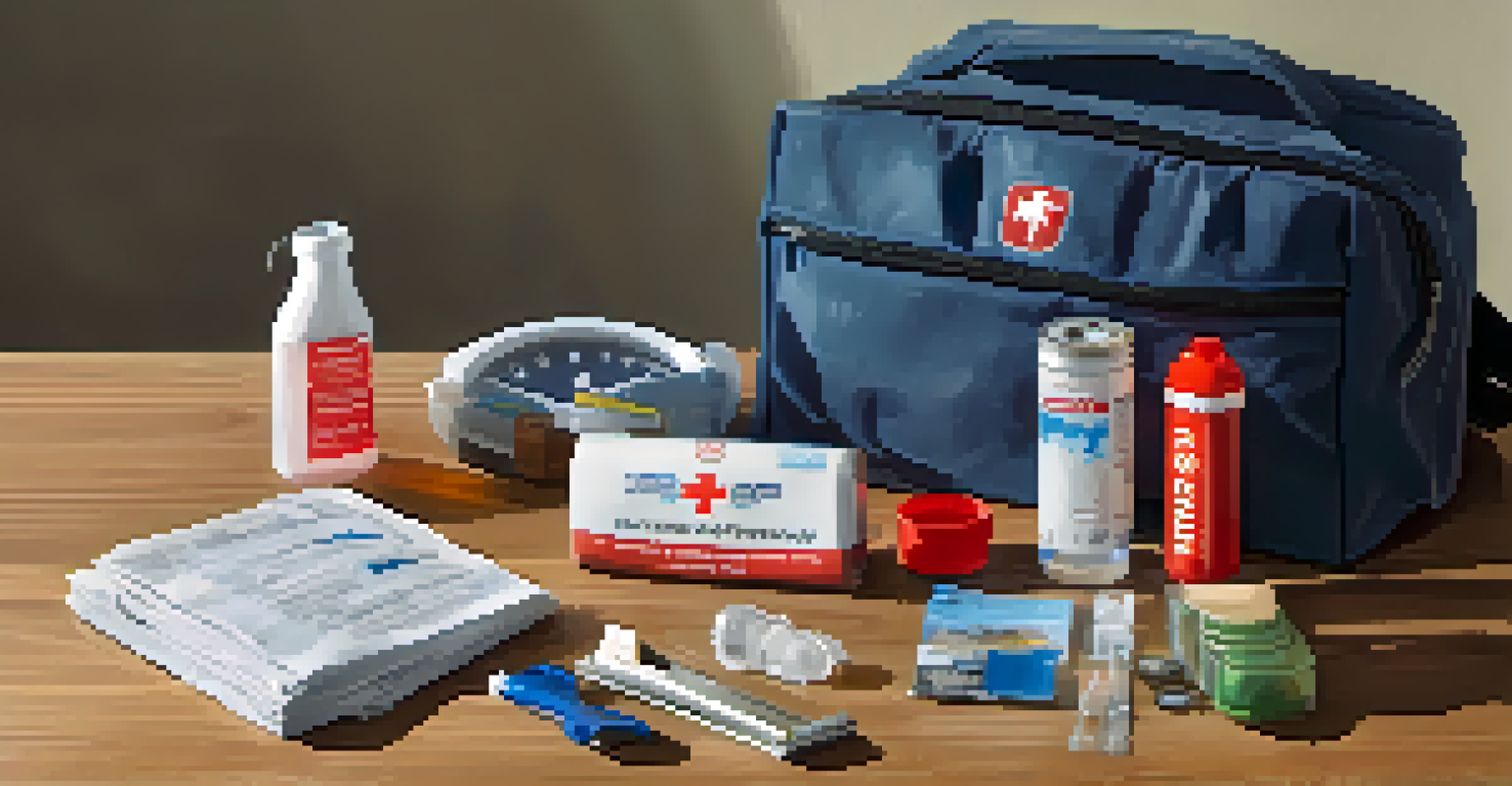Crisis Travel: Preparing for Natural Disasters Abroad

Understanding the Risks: Types of Natural Disasters
When we think about traveling, we often envision beautiful landscapes and exciting adventures. However, it’s crucial to acknowledge that some destinations may be prone to natural disasters, such as earthquakes, hurricanes, or wildfires. Understanding these risks can help you prepare effectively and make informed decisions about where to travel.
By failing to prepare, you are preparing to fail.
For example, if you're planning a trip to the Caribbean during hurricane season, knowing the likelihood of storms can guide your travel dates and insurance choices. Similarly, areas with a history of seismic activity may warrant extra caution and awareness. Recognizing these risks sets the stage for our next steps in crisis travel preparation.
Ultimately, being aware of the types of natural disasters that can occur in your destination allows you to take proactive measures. This knowledge empowers you to travel with confidence, ensuring that you can enjoy your trip while being prepared for the unexpected.
Do Your Homework: Research Destination Risks
Before you hop on a plane, take some time to research the potential natural disaster risks at your destination. Websites like the U.S. Geological Survey (USGS) or the National Oceanic and Atmospheric Administration (NOAA) offer valuable information about recent activity and forecasts. Knowing if your destination has recently faced severe weather or geological events can help inform your travel plans.

Additionally, looking into local emergency services and evacuation routes can be immensely helpful. For instance, if you're heading to a coastal area, understanding how local authorities respond to hurricanes can give you peace of mind. This research forms a crucial part of your crisis travel strategy.
Research Destination Risks
Understanding the potential natural disaster risks at your travel destination is crucial for informed planning and safety.
By staying informed, you not only equip yourself with essential knowledge but also show respect for the local communities. Engaging with local news sources or travel forums can provide real-time insights that help you stay aware of any changing situations.
Pack Smart: Essentials for Crisis Preparedness
Packing smart is a key aspect of preparing for any travel situation, especially when natural disasters are a possibility. Start with a well-stocked emergency kit that includes essentials like water, non-perishable food, a flashlight, and a first-aid kit. These items can be a lifesaver if you find yourself in a situation where access to supplies is limited.
The best way to predict the future is to create it.
Consider also packing important documents in a waterproof bag, including your passport, travel insurance, and any necessary medical information. Having these documents easily accessible can make a huge difference during an emergency. Think of it as packing a safety net to catch you if things go awry.
Lastly, don’t forget about your electronic devices. Charging power banks and downloading offline maps can keep you connected even if power outages occur. Being prepared with the right gear allows you to focus on staying safe rather than scrambling for supplies during a crisis.
Stay Informed: Utilize Technology and Resources
In today’s digital age, we have a wealth of information at our fingertips. There are numerous apps and resources available to help keep you informed during a crisis, including weather alerts and emergency notifications. These tools can provide real-time updates and help you make quick decisions if a natural disaster strikes.
For instance, downloading apps like FEMA or Red Cross can give you access to emergency plans and safety tips tailored to your location. Additionally, social media platforms can serve as valuable sources for on-the-ground updates. Staying connected can be your lifeline when navigating through unpredictable situations.
Pack Emergency Essentials
Having a well-stocked emergency kit and important documents can significantly enhance your preparedness during a crisis.
Ultimately, technology can be a powerful ally in crisis travel. By leveraging these resources, you can stay ahead of potential disasters and make informed choices to safeguard yourself and your travel companions.
Create a Communication Plan with Loved Ones
Having a clear communication plan in place is essential when traveling, especially in areas prone to natural disasters. Discuss with your family or friends how you'll check in with them during your trip, and establish designated times for updates. This reassurance can help ease their worries while you’re away.
Consider designating a specific contact person who will be your point of communication in case of an emergency. Share your itinerary, including hotel addresses and travel routes, so they know where to reach you. This way, if something unexpected happens, they have the information needed to assist you.
Additionally, ensure that your loved ones know how to reach you through various means, whether it be phone calls, texts, or social media. Having multiple channels of communication can be crucial during a crisis, especially if traditional networks are disrupted.
Know Local Emergency Procedures and Resources
Once you arrive at your destination, familiarize yourself with local emergency procedures and resources. This can include knowing the location of the nearest hospital, police station, or emergency shelter. Understanding how local authorities respond to disasters will provide valuable insight into what to expect in case of an emergency.
Many hotels and accommodations provide information about emergency plans and procedures. Take the time to review this information upon check-in. It’s a small step that can significantly enhance your safety and preparedness.
Create a Communication Plan
Establishing a clear communication strategy with loved ones helps ensure they know how to reach you during emergencies.
Additionally, consider connecting with local residents or fellow travelers who can share insights about the area’s emergency protocols. Building these connections not only enriches your travel experience but also arms you with the knowledge needed to navigate potential challenges.
Remain Calm: Strategies for Staying Composed
In the face of a natural disaster, staying calm is essential. Panic can cloud judgment and hinder your ability to make sound decisions. Practice deep breathing or mindfulness techniques to help maintain your composure when situations become stressful. Remember, your safety is the priority.
Having a mental checklist of steps to take during a crisis can also be helpful. This might include identifying safe locations, reaching out to emergency contacts, and executing your communication plan. By having a plan in your mind, you can act quickly and efficiently.

Lastly, surround yourself with supportive travel companions who can help maintain a sense of calm during turbulent times. Sharing your thoughts and feelings with others can alleviate anxiety and create a supportive environment. Together, you can navigate through challenges and emerge stronger.